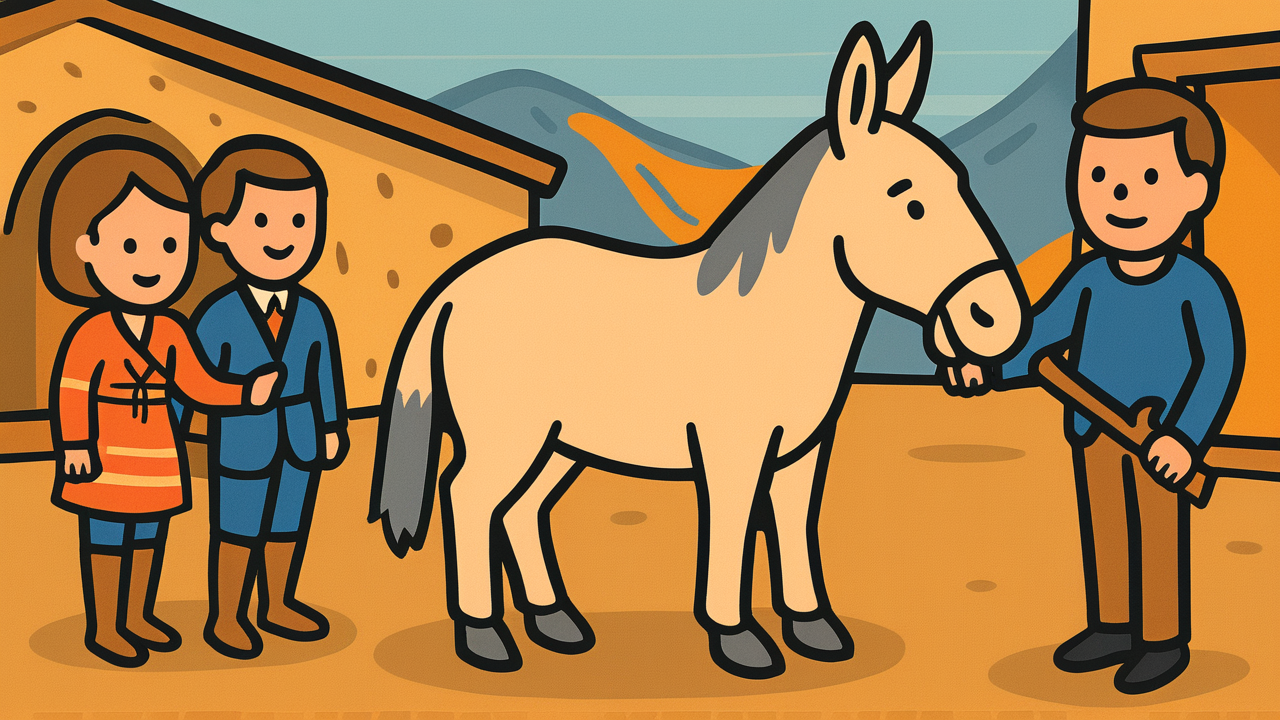How to Read “驢事未だ去らざるに馬事到来す”
roji imada saranu ni baji tōrai su
Meaning of “驢事未だ去らざるに馬事到来す”
This proverb describes a situation where new problems arise one after another while one problem or trouble has not yet been resolved.
This is exactly like the “adding insult to injury” situations that everyone experiences even in modern times. When you’re busy dealing with a problem at work, another issue arises with a different project. At home, while you’re caring for a sick child, you yourself fall ill. This proverb accurately expresses such unfortunate situations where problems pile up.
The reason for using this proverb is that rather than simply saying “it’s tough,” it emphasizes the special situation where problems occur consecutively. It can express the particular nature of a situation that becomes difficult precisely because problems overlap, when each one individually could be somehow managed. Even today, if someone who knows this expression uses it, listeners will deeply understand that “ah, this is truly a difficult situation.”
Origin and Etymology
The origin of this proverb is thought to trace back to Chinese classics. “驢” refers to donkeys, and “馬” refers to horses, both of which were important livestock for carrying loads. In ancient China, these animals were indispensable to merchants and travelers.
The expressions “donkey matter” and “horse matter” respectively mean problems related to donkeys and problems related to horses. It expresses a situation where new problems related to one animal arise while troubles related to another animal have not yet been resolved.
This proverb was probably introduced to Japan through the study of Chinese literature. Since it can be found in Edo period documents, it’s presumed to have been used among Japanese intellectuals from quite early times.
What’s interesting is that while horses were familiar animals in Japan, donkeys were not particularly common. Yet the combination of “donkey and horse” became established, perhaps due to the authority of Chinese classics and the good rhythm of this expression. The sound of “Donkey matter not yet departed while horse matter arrives” truly expresses the way problems come rushing one after another.
Usage Examples
- While being pressed by project deadlines, it’s a case of “Donkey matter not yet departed while horse matter arrives” – now problems have arisen with another project as well
- Just when I thought my cold was getting better, it’s “Donkey matter not yet departed while horse matter arrives” – now I’ve hurt my back
Modern Interpretation
In modern society, the situations this proverb describes occur more frequently and more complexly. As a characteristic of the information society, processing multiple tasks simultaneously has become commonplace, and it’s routine for the next challenge to arrive before one problem is resolved.
Particularly in business settings, new demands and problems arrive constantly through various channels like email, chat, and phone calls. With the spread of social media, situations continue where we’re constantly required to respond to something even in our private lives. “Donkey matter not yet departed while horse matter arrives” has truly come to have new meaning as words expressing the daily life of modern people.
However, in modern times, rather than giving up on this as classical “misfortune,” the emphasis is on how to efficiently manage this situation. Skills for handling multiple problems simultaneously have developed, such as task management tools and prioritization techniques.
On the other hand, this proverb also sounds an important warning to modern people. Haven’t we become too accustomed to situations where problems arise one after another, forgetting to carefully face each individual problem? The wisdom of the classics also teaches us the importance of sometimes stopping and working toward fundamental solutions.
When AI Hears This
Modern business books tout “multitasking ability” as the key to success, but Stanford University research reveals that the human brain cannot actually process tasks simultaneously—it merely switches between tasks at high speed. This switching cost reduces work efficiency by up to 40%.
“The donkey’s work is not yet done when the horse’s work arrives” warned of this very phenomenon centuries ago. The situation where horse duties arrive before donkey duties are finished perfectly mirrors the vicious cycle modern people fall into: “New meetings begin before we’ve finished replying to previous emails, and the next project arrives while our preparation remains half-baked.”
What’s fascinating is how Eastern concepts of time emphasize linear processing—”completing one thing before moving to the next.” This aligns with Zen philosophy of “ichigo ichie” (one time, one meeting) and the tea ceremony’s focus on “concentrating on each individual movement.” Western efficiency thinking, by contrast, tends toward the idea of “doing multiple things simultaneously to save time.”
Indeed, Cal Newport, a leading researcher in concentration studies, concludes that “deep work”—profound immersion in a single task—is what generates true productivity. The ancient wisdom of clearly separating “donkey work” from “horse work” had already anticipated the ideal working style that modern neuroscience now proves effective.
Lessons for Today
What this proverb teaches modern people is that overlapping problems are a natural part of life. Rather than becoming exhausted trying to control everything perfectly, it’s important to sometimes have the mental space to accept that “that’s just how it is.”
In modern society, we tend to feel pressure that we must solve everything efficiently. However, this proverb teaches us that people have faced similar situations since ancient times. The difficulties you’re facing now are by no means special.
What’s important is to clarify priorities precisely when problems pile up. Rather than trying to solve everything simultaneously and perfectly, you should start with the most important things and work on them one by one.
And by experiencing such situations, you become stronger and more flexible. The experience of overlapping problems is actually a valuable learning opportunity in life. The next time you encounter a similar situation, you’ll surely be able to handle it better than now. Please try to see difficult times as opportunities for your own growth.



Comments